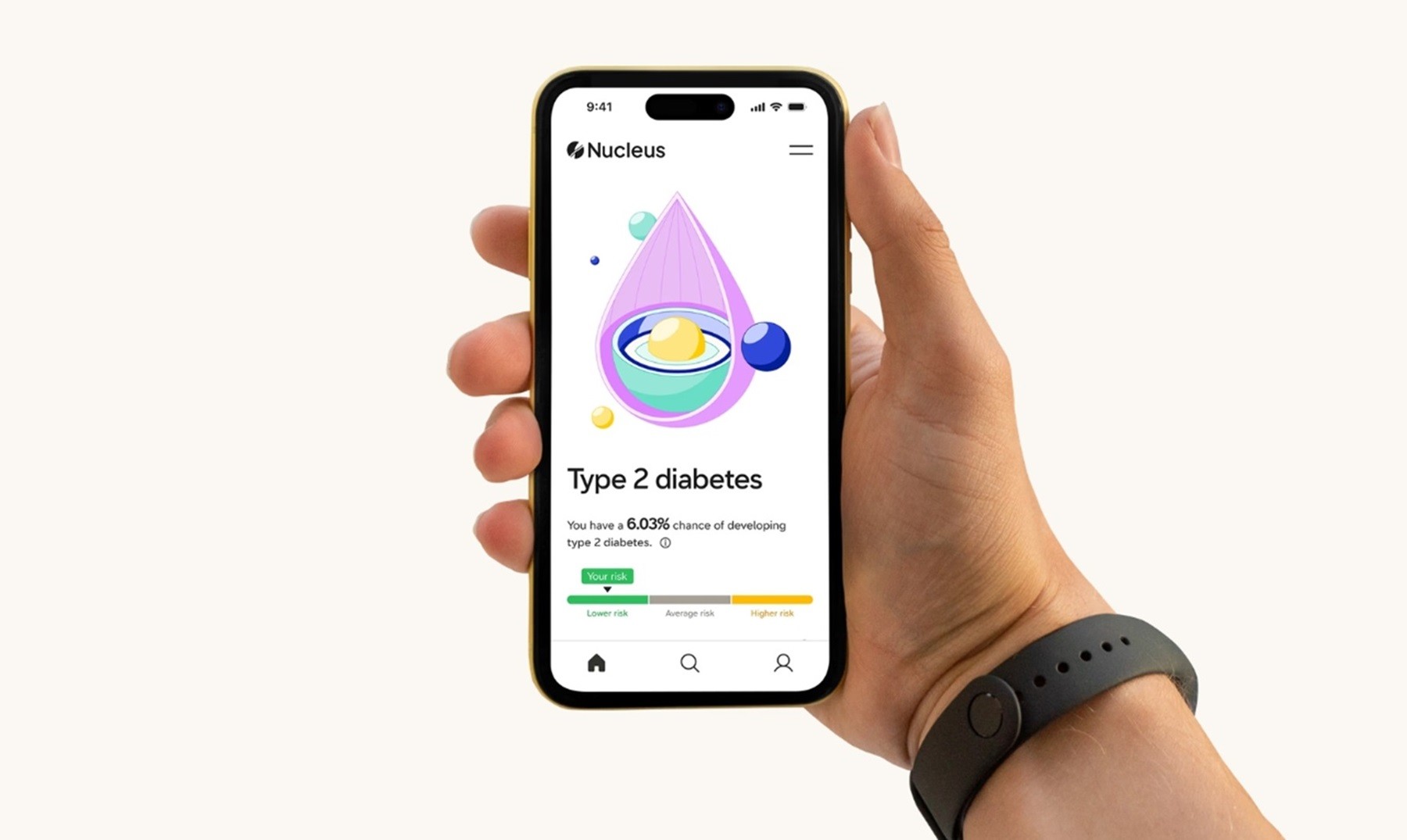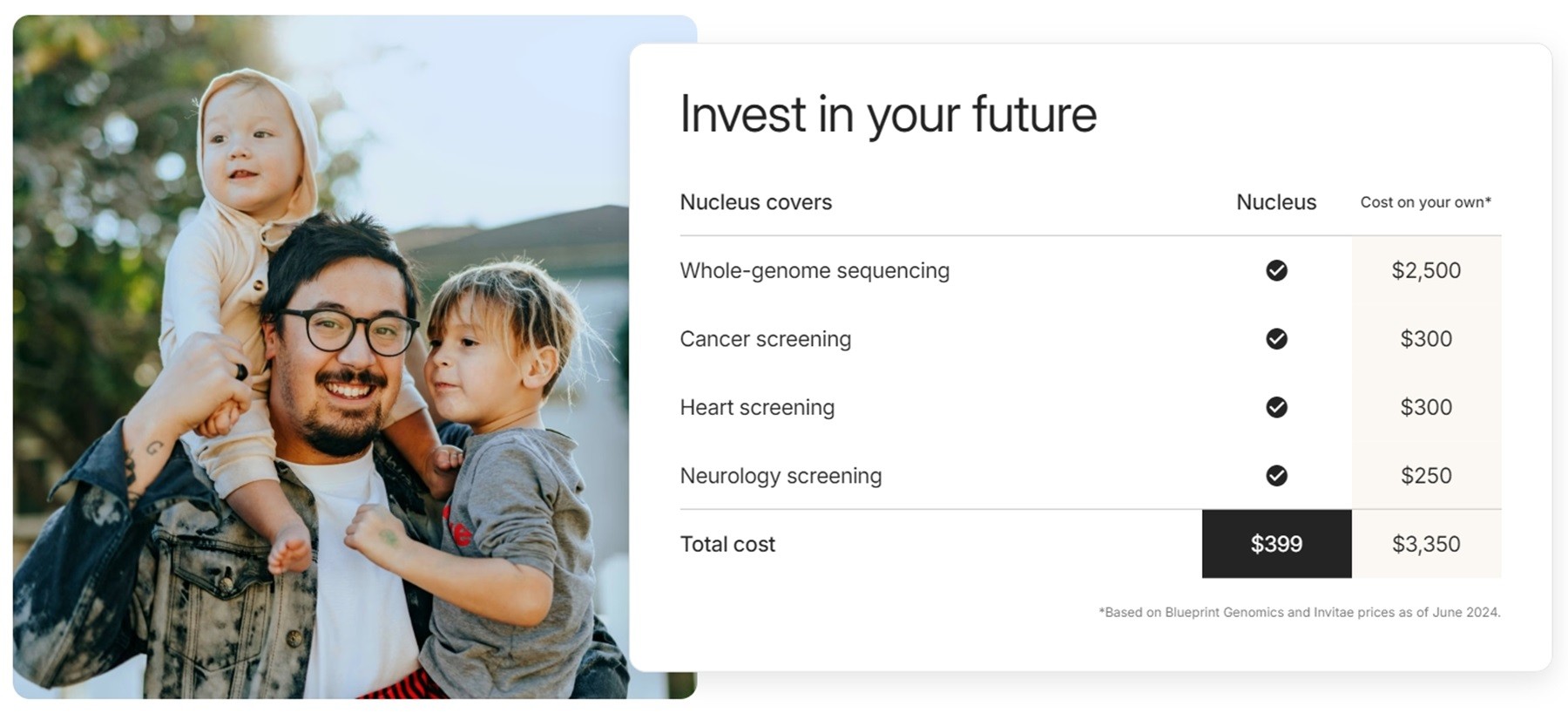Most people know that vegetables are good for you and sugar is unhealthy when consumed often and in large amounts. Still, modern science can give us a much broader understanding of the relationship between our diet, health, and the genetic background behind it. Nutrigenomics, specifically, helps us understand how our genes and the food we eat interact.
Backed by science, nutritionists and other practitioners can provide advice that expands beyond generic guidelines. These personalized, evidence-based dietary plans may help you prevent diseases and conditions or keep them under control.
Discover more in our guide as we define nutrigenomics, point out its current benefits and limitations, and explain how you can access tailored nutritional insights.
What is nutrigenomics?
Nutritional genomics, or nutrigenomics, is the study of the interplay of your genes and nutrition. It’s a broad field that encompasses various disciplines, including genomics, nutrition, molecular biology, and biochemistry.
Nutrigenomics mainly aims to explain how the food you eat affects your gene expression and potentially leads to diseases. Still, many sources leverage the broader definition in which nutrigenomics also includes nutrigenetics, the study of how your genes affect your body’s reaction to different foods and dietary preferences.
To understand how nutrigenomics works, it helps to start with the basics. Your DNA, the genetic material you inherited from your parents, gives your body instructions on how to interact with the world — including the food you ingest. In some instances, your DNA may dictate your body to put you at risk for a specific condition or disease, such as cancer, which doesn’t mean you’ll surely develop it.
That’s where your environment and habits come in. Healthy lifestyle choices, including a balanced diet, consistent sleep, and regular exercise, can lower some of the risks your genes hold and potentially prevent certain conditions. In the same way, poor decisions can increase your risk and even worsen the symptoms you already have.
Nutrigenomics may help you manage these risks by helping you understand them and providing actionable advice promoting a healthy and well-balanced diet.

Source: Brooke Lark
A brief history of nutrigenomics
Much before nutrigenomics was an established field, scientists were interested in the relationship between genetics and diet. They observed examples of genetic influence on food response, including the so-called inborn errors of metabolism — conditions they could treat by modifying the patient’s diet.
One example of such a condition is phenylketonuria, a rare hereditary disorder that prevents the patient’s body from breaking down the amino acid phenylalanine, which then builds up and causes severe side effects, including mental disability. Doctors could treat the condition by limiting foods containing this compound in the patient’s diet.
Still, nutrigenomics only took off after the Human Genome Project. Launched in the 1990s and finished in the 2000s, the project was the first successful attempt to read the full sequence of the human genetic code.
This event jump-started the field of nutrigenomics, while the subsequent development of sequencing, the technology used to determine the sequence of DNA bases, allowed it to grow.
Diseases and conditions influenced by genes and diet
The relationship between genes and diet is complex. Diseases, especially chronic ones, are rarely caused by genetic variants (genetic differences) that occur on a single gene — they usually involve many genes. Similarly, genetics are rarely affected by one specific food or nutrient. Numerous factors, including environment and lifestyle, influence them.
Because of these intricacies, scientists haven’t yet studied all possible relationships and outcomes, but research is progressing rapidly. So far, we know how some nutrients, or their deficiency or sufficiency, can contribute to various physical and mental conditions.
For example, these nutrients have been found to influence gene expression:
Vitamin A
Vitamin D
Fatty acids
Protein
Folate
Choline
To give you some practical examples, the table below presents known links between genes, diet, and common diseases and conditions:
Potential benefits of nutrigenomics
Nutrigenomics paves the way for personalized nutrition advice, which you can apply to disease prevention and treatment as well as:
General health and well-being
Weight loss
Performance enhancement
Although nutrigenomics is not the end-all and be-all and can’t treat diseases single-handedly, it may offer some direction and support other treatments and interventions. In some cases, it might reduce the need for medications that lead to severe side effects and withdrawal.

Source: dbreen
While we need a lot more research and trials to integrate nutrigenomics into standard medical practice, current evidence points to its potential effectiveness in promoting health. Nutrigenomic advice may be superior to one-size-fits-all solutions, such as the idea that taking omega-3 fatty acids is universally beneficial, which can be false for some individuals.
Today, genetic testing and advanced methods like whole-genome sequencing (WGS) are highly accessible, so many individuals can have their DNA analyzed to gain detailed health insights and tailored advice.
Pro tip: You can get clinical-grade, whole-genome screening with Nucleus’ at-home DNA test to understand your predispositions to various diseases and conditions. By offering detailed reports with 99.9% accuracy, Nucleus can help you and your healthcare provider create the ideal diet to control these risks and nurture your body’s specific needs.
Examples of nutrigenomics application
So far, nutrigenomic research has uncovered many potentially beneficial relationships between specific nutrients, diets, and conditions. Below, you can find some examples of such findings:
Aside from medical treatment, nutrigenomics has potentially favorable effects for:
Weight loss: Supplementation of HCA and niacin-bound chromium might aid in weight management and lower the production or activity of leptin, the hormone that regulates energy and appetite.
Athletic performance: Coenzyme NAD may help enhance skeletal muscle activity, while calcium and vitamin D support bone health. Iron, folate, and B12, on the other hand, influence oxygen delivery.

Source: silviarita
Bonus read: If you’re interested in biohacking concepts, check out these guides:
Limitations of nutrigenomics
Although it has been a subject of interest for a while, nutrigenomics is still a young discipline. While some evidence supports the effectiveness of specific nutrigenomic treatments and personalized nutrition advice, this is insufficient to put the findings into practice and create policies. For that, we’d need a lot more clinical trials on human subjects across genders, ages, locations, and health conditions, and — so far, there have been many barriers slowing down research.
One of them is the sheer complexity of nutrition, genetics, and their relationship. For example, while researchers have identified about 97 genetic variants linked with fat accumulation so far, these variants together explain less than 3% of body mass index (BMI) variance, which shows how limited our understanding is.
While commercially available genetic tests claim to provide tailored dietary recommendations, the reality is that many of them rely on weak or false gene-disease associations. They also often lack transparency in how they derive recommendations from the findings.
Unlike whole-genome tests, these tests usually rely on genotyping technology, which analyzes only a handful of genes and cannot provide a complete assessment of your health risks or traits.
How nutrigenomic testing works
Nutrigenomic testing is the process of analyzing your genes to uncover your unique nutritional needs. Once you provide a DNA sample, the lab will identify genes associated with diseases and conditions, especially those that interact with specific nutrients. The results typically take a few weeks.
For nutrigenomic testing, it’s best to consult a nutrition expert, ideally one with training in nutrigenomics. They can point you to a certified lab, interpret your results, provide dietary recommendations accordingly, and modify them based on your feedback.

Source: cottonbro studio
If you want to try an at-home test for nutrigenomic or other purposes, choose a reputable company that provides clinical-grade analysis, is transparent about its processes, and uses the latest sequencing technology.
For detailed insights into your genetic predispositions, go with Nucleus, a fully regulated DNA platform offering physician-ordered tests. Besides using whole-genome sequencing technology to analyze almost 100% of your DNA, Nucleus considers your lifestyle factors to provide a detailed and accurate assessment.
The insights you get can help you shape your lifestyle choices, including your diet, to ensure a longer, healthier, and happier life.
Nucleus: Comprehensive DNA insights for a healthier future
Based on a simple cheek swab, Nucleus can decode almost all 6 billion data points in your DNA, including rare variants that other tests miss, and uncover how your genes influence your genetic risks for multiple diseases and conditions. The reports are comprehensive and easy to understand, using clear language and illustrations.
Nucleus screens for over 170 diseases and conditions, including those that have a strong association with diet, such as:
Type 2 diabetes
Celiac disease
Breast cancer
Heart disease
Alzheimer’s disease
Depression
You’ll also get reports that assess the genetic component of your BMI, height, longevity, and many other traits.

The physician-approved test can help your nutritionist or doctor give you personalized advice. Nucleus can also connect you with a genetic counselor if you need guidance on your results or the next steps.
As a HIPAA-compliant platform, Nucleus takes numerous measures to protect your sensitive data. The company works only with CAP and CLIA-certified labs in the U.S. that follow stringent quality standards.
Take the Nucleus DNA test
Nucleus Premium is one of the most affordable whole-genome tests available. While most tests cost thousands, Nucleus Premium is only [PRICE.KIT_SOLO.ONE]. Nucleus is also HSA and FSA eligible, so you may be able to cover some of the expenses with your health savings plan.
The package includes all available health and trait reports. The platform also updates your reports as genetic research and your lifestyle factors evolve.

Collecting your samples takes only minutes. Swab your cheeks and mail the samples to the Nucleus lab, and you’ll be able to see your results in your online account within 6–8 weeks.
To start your Nucleus journey, take these three simple steps:
Provide your personal information
Order your Nucleus Premium kit
You may also like…
Read our other articles to learn about optimizing your health and cognition:
Featured image source: julien Tromeur













